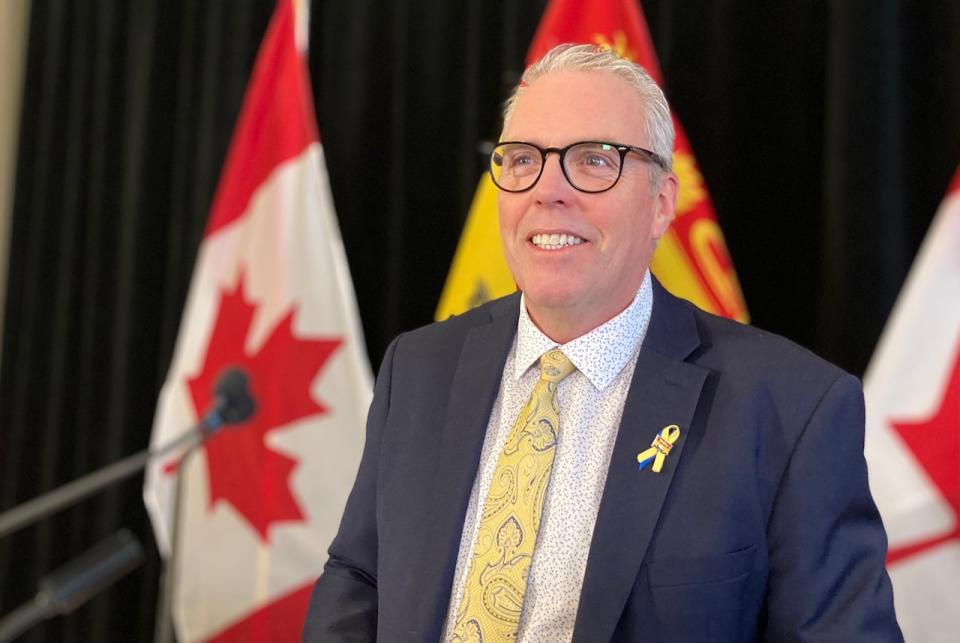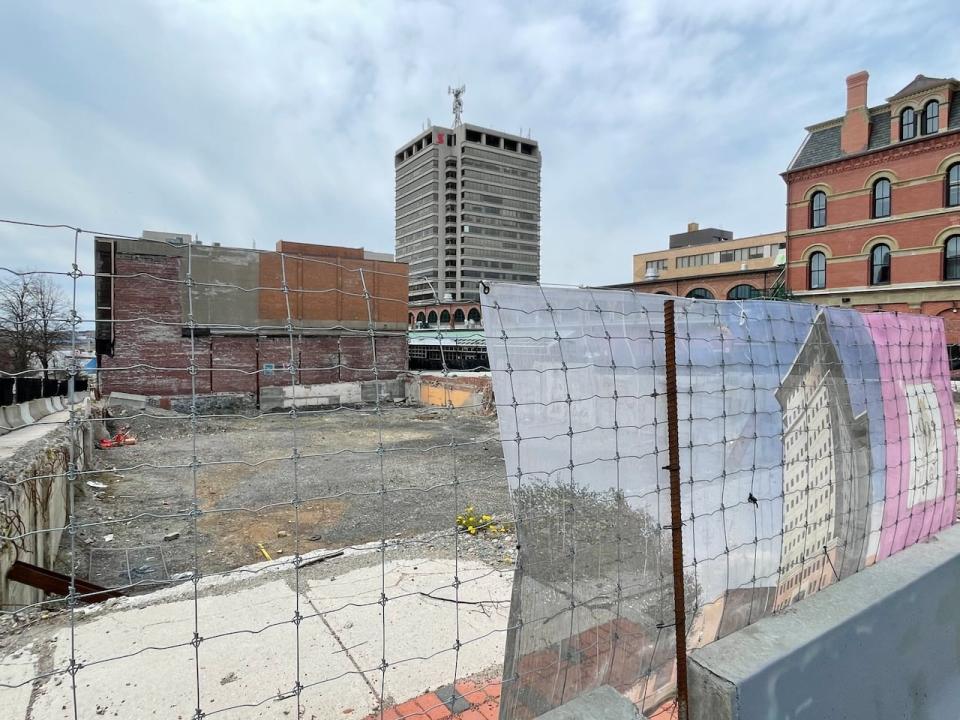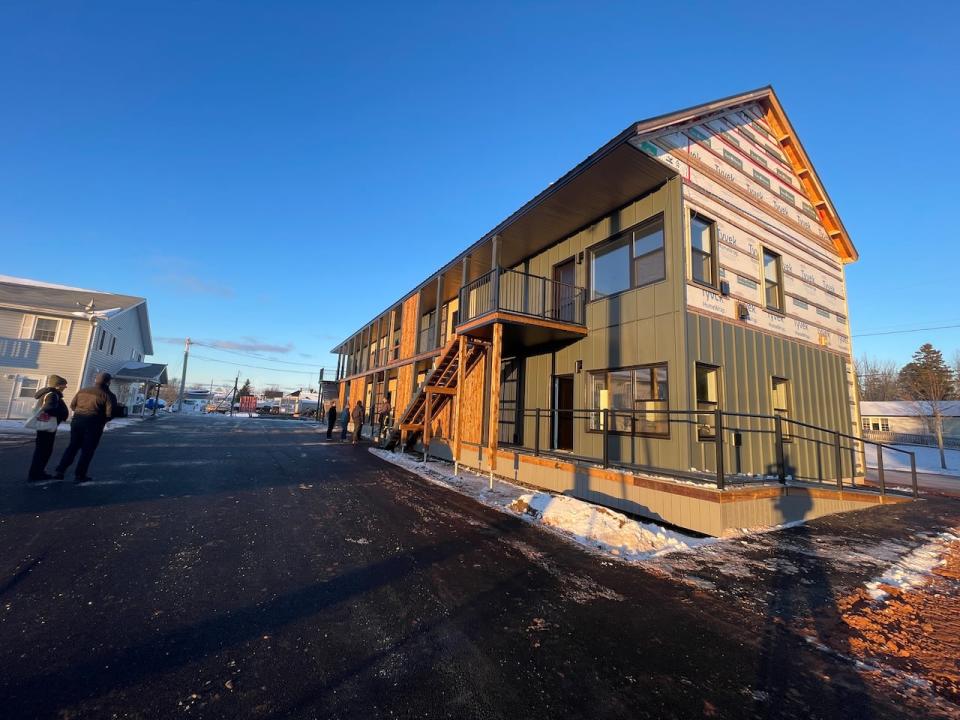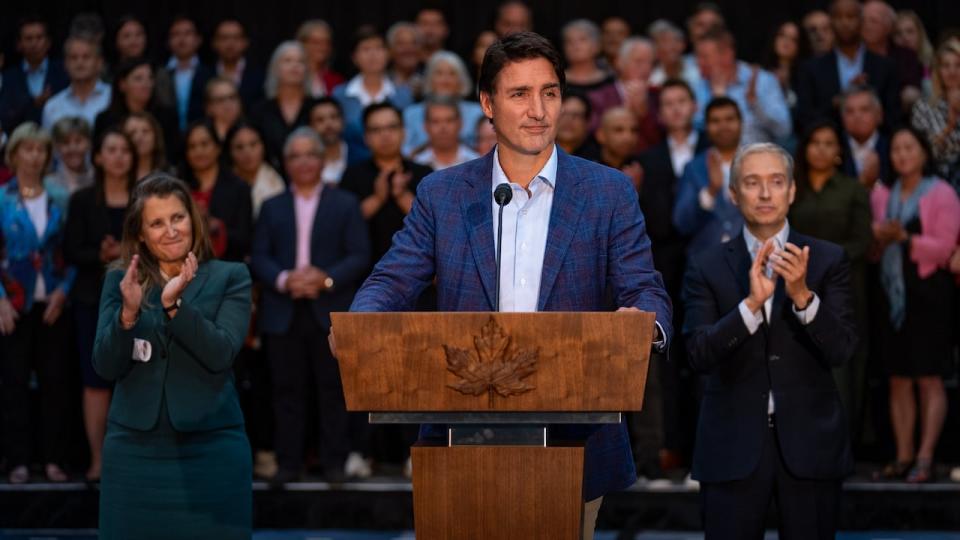Housing starts in New Brunswick lagging further behind Maritime neighbours in early 2024

The New Brunswick government missed its target for new housing starts in 2023 by a wide margin but says it is still not interested in cutting sales taxes on new apartment builds in 2024, despite provinces that have tried the idea experiencing a surge in new construction.
Figures show Prince Edward Island and Nova Scotia saw construction start on new apartments at a rate three times higher than New Brunswick during the first three months of 2024, after they moved to lower construction costs by cutting taxes.
Kelvin Ndoro, a housing analyst with the Canada Mortgage and Housing Corporation, said eliminating sales taxes on new rental developments does appear to be helping to get housing built more quickly in provinces that adopted the policy, at least in the short term.
"The general view from the developing community is the HST rebates are expediting ongoing projects," said Ndoro.

Kelvin Ndoro, a senior analyst with CMHC, said there has been a jump in housing starts in Nova Scotia since the provincial and federal governments cut taxes on new apartment developments. (CBC)
Last September, Prime Minister Justin Trudeau announced the federal government was making good on a mothballed 2015 election promise to stop charging 5 per cent GST on the construction of new rental buildings to encourage faster development of housing.
Trudeau then urged provinces to copy the plan to amplify the effect of the tax change.
"We are going to be removing the federal GST for the construction of new apartment buildings, and I'm encouraging all provinces to do the same," said Trudeau on Sept. 14.
WATCH | CBC Explains: What's the housing holdup?
A number of provinces agreed to the idea, including New Brunswick's two Maritime neighbours. Nova Scotia and Prince Edward Island both dropped their own portion of the HST charged on new rental property construction, with a variety of conditions, to add to the federal reduction.
Nova Scotia Premier Tim Houston said he was unsure what cutting the sales tax would accomplish but the urgency of getting new housing built in Nova Scotia convinced him to join the federal initiative.
"In the fullness of time, will this particular step prove to have been the most effective?" Houston asked, rhetorically, in announcing the tax cut last fall.

Nova Scotia Premier Tim Houston said he is unconcerned about his province losing millions of dollars in sales tax revenue on newly built apartment complexes, if it results in more housing being built faster. (Robert Short/CBC)
"I don't know that it will but we're going to try everything, including this. It's an idea and we're in the business of trying ideas to solve problems, so we're trying this one."
New Brunswick is equally in need of new housing. However Finance Minister Ernie Steeves rejected the federal idea as too expensive.
Developers can owe millions of dollars in HST at the end of building a large apartment complex, and governments eliminating that charge are hoping stalled or economically marginal projects will become viable and move forward.
Houston acknowledged the initiative could cost Nova Scotia up to $100 million in reduced sales tax per year, or more if it triggers more construction than expected, but said cost was not a deterrent.
"In many ways I hope the cost goes up because that means there's more housing starts and more construction happening," said Houston.
The effect of New Brunswick making a different decision about embracing the federal initiative than its neighbours appeared to show itself quickly in construction activity.

The developer behind a stalled commercial and apartment complex on King Street in Saint John has suggested provincial tax changes, like those adopted in Nova Scotia and Prince Edward Island to encourage more housing, would improve the project's viability. (Robert Jones/CBC)
According to CMHC data released in April, apartment units that began construction in Nova Scotia totalled 1,735 during the first three months of 2024 under the new tax rules, with an additional 287 started in Prince Edward Island.
It is a rate of new apartment starts of just above 162 units per 100,000 population, in each province, for the three-month period.
That is triple the number in New Brunswick, which recorded 467 new apartment units starting construction, a rate of 55 per 100,000 population.
For New Brunswick, it is the equivalent of 900 fewer apartment units beginning construction during the first three months of 2024 than if it had been able to match rates in the other two provinces.
Ndoro said housing is a complex issue with multiple policies affecting construction decisions at any one time but there is little doubt the removal of the HST has been having an effect in the region.
'If New Brunswick was going to apply a similar policy, I would expect positive returns there as well," he said.

A newly built apartment complex in Alberton, Prince Edward Island. For its size, P.E.I. started construction on new apartment units during the first three months of 2024 at triple the rate of New Brunswick after eliminating sales tax on new rental construction. (Sheehan Desjardins/CBC)
The New Brunswick government has consistently argued that building more places for people to live is key to solving a number of housing problems, including low vacancy rates, high rents and growing homelessness.
New Brunswick has taken different steps to try to spur apartment construction in the past, including a controversial decision to cancel rent-cap protections for tenants in 2023 to encourage developers to build.
But in an email earlier this week, Mir Hyder, a spokesperson for the Department of Finance, said the province is not prepared to cut the sales tax on new apartment buildings to encourage development, in part because he said the province is concerned tenants may not benefit.
"Following some analysis by government, it still isn't clear that rebating the provincial portion of the HST for real estate developers of purpose-built rental properties would result in benefits to tenants — such as lower, more-affordable rents," wrote Hyder.
However, the New Brunswick government's own housing strategy, released last year, makes the opposite point, arguing that any increase in the housing supply benefits all tenants.
According to the strategy document, housing developments of any type, including high-end developments, are needed to help lower vacancy rates and improve affordability up and down the income ladder.
"A low inventory of housing at all price points has added pressure to the markets," the strategy document explains.
"Without an ample supply of market-priced homes and rentals, the inventory of affordable housing will continue to be depleted."

Prime Minister Justin Trudeau in London, Ont., flanked by Finance Minister Chrystia Freeland and Innovation, Science and Industry Minister Francois-Philippe Champagne last September. Trudeau announced plans to cut federal sales taxes on new apartment developments and invited provinces to do the same. (Sylvain Lepage/CBC News)
The provincial government claims it also has reservations about whether New Brunswick builders are capable of matching the pace of building that is happenning in Prince Edward Island and Nova Scotia.
Even though housing starts in New Brunswick in early 2024 trailed neighbouring jurisdictions, Hyder wrote that it was still "an all-time high" for the province, with restrictions on how much more can be done.
"In New Brunswick, rental construction is consistently running at, or near, record levels, resulting in limited capacity for further increases in construction in the short term," he wrote.
New Brunswick has a goal of producing 6,000 new housing starts per year to solve its housing troubles but has been unable to reach that number.
In 2023, it posted 4,547 new housing starts. That was the lowest rate per capita among the three Maritime provinces and a three percent decline from 2022.


